Personal injury claims are a significant concern in the UK, impacting thousands of citizens yearly. As we enter 2025, new trends and data are shaping the landscape of these claims, including shifting causes of injury, evolving legal processes, the growing involvement of personal injury solicitors, and the increasing challenges claimants face.
To learn more about the latest personal injury statistics, we leveraged AI-driven audience profiling to synthesise insights from opinions expressed online to a high statistical confidence level. We focused on 305,550 British citizens injured over a year, ending 15 January 2025. Our data revealed key patterns and trends in the sector and provided more clarity on the topic.
Index
- 74.2% of British citizens who’ve experienced personal injury were attacked by animals
- 60.1% of British citizen's mental health was significantly impacted by injury
- 36.4% victims cite their circumstances as the reason for pursuing or not pursuing personal injury claims
- 64.4% of the audience considered seeking legal advice as an alternative to making a formal personal injury claim
- 33.9% of the audience say time delays were the biggest challenge during the claims process
- 39.9% of our audience chose a law firm or solicitor based on positive client reviews
- 50.2% of injured British citizens received a substantial insurance payout
- 27.9% of our audience found legal advice forms most helpful for learning about personal injury claims
- 19.6% of our audience said legal representation could be improved in the UK personal injury claims process
- 57.5% of our audience said they would likely claim if they experienced another personal injury
- Current Trends in Personal Injury Claims
- A Decline in Personal Injury Claims
- Increase in Private Equity Investment in Law Firms Specialising in Personal Injury
- Introduction of Fixed Recoverable Costs (FRCs)
- Increase in Claims Inflation
- Surge in ‘Crash for Cash’ Scams
- 24.5% of British citizens who experienced personal injury are 65 or older
- 53.1% of British citizens who experienced personal injury were males
- 45% of British citizens who experienced personal injury are in Leeds
- About the Data
What Was The Primary Cause Of Your Injury?
74.2% of British citizens who’ve experienced personal injury were attacked by animals
Injuries can happen anytime, anywhere. The graph below indicates the primary causes of our audiences’ injuries:
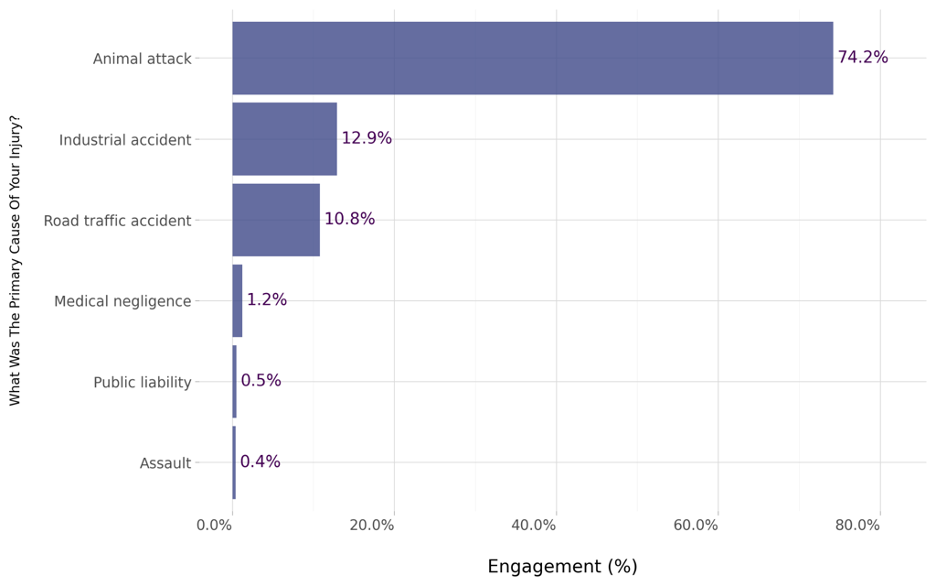
There’s been a 21% increase in dog attacks in England and Wales in the last year, and animal attacks were also the primary cause of the majority of our audience’s personal injuries, with 74.2% of our audience naming these.
The second most common cause was industrial accidents (12.9%), followed by road traffic accidents (10.8%). 1.2% of our audience said that medical negligence was the main cause of their injuries, while 0.5% said that they were injured as a result of public liability.
Interestingly, despite the ONS reporting an increase in assault victims requiring hospital admission, assault was at the bottom of the list, with only 0.4% of British citizens who experienced personal injury citing this as the primary cause.
How Much Did The Injury Impact Your Daily Activities?
60.1% of British citizens mental health was significantly impacted by injury
Depending on its nature, a personal injury can severely impact mental and/or physical health, affecting daily activities and diminishing quality of life. Find out how our audience was affected by personal injury:
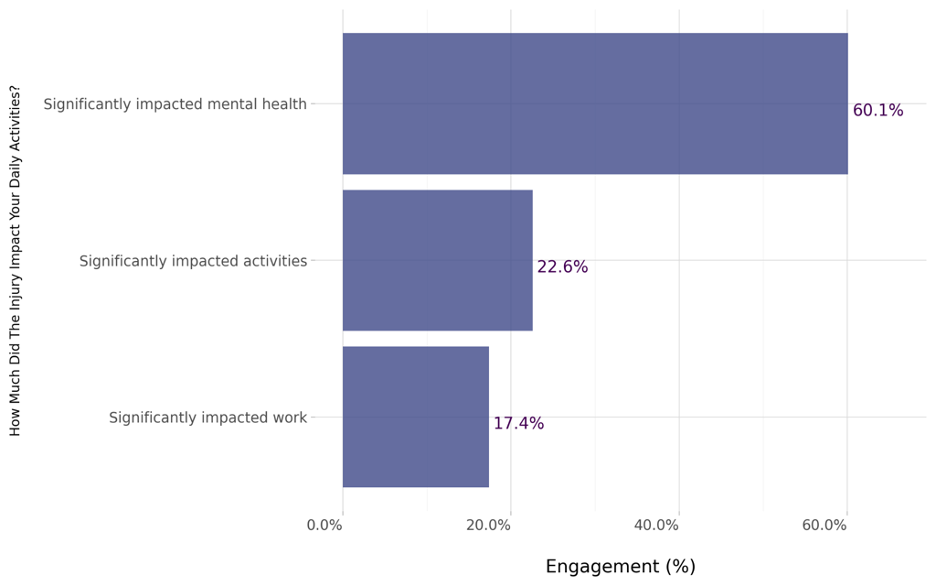
The majority (60.1) of British citizens who’ve experienced personal injury said that their injuries had a significant impact on their mental health. According to the NHS, it’s normal to experience psychological symptoms after a physical trauma, although this usually improves over time. Initially, injured people may experience physical and psychological symptoms of an adrenaline rush. However, some individuals may experience other symptoms, such as anger, anxiety, denial, depression, guilt, or shame, and may need support in managing these symptoms, especially if they impede daily activities.
22.6% of our audience said their personal injuries significantly impacted various activities, and 17.4% said their injuries significantly affected their work. While the percentage of those who said that their injuries affected their work is the smallest, personal injuries can disrupt local and national economies. The Health and Safety Executive estimated that 33.7 million working days were lost due to work-related ill health and non-fatal workplace injuries in 2023/24.
What Led You To Decide To Pursue Or Not Pursue A Personal Injury Claim?
36.4% victims cite their circumstances as the reason for pursuing or not pursuing personal injury claims
The graph below shows the reasons why British citizens who experienced personal injury either did or did not pursue personal injury claims:
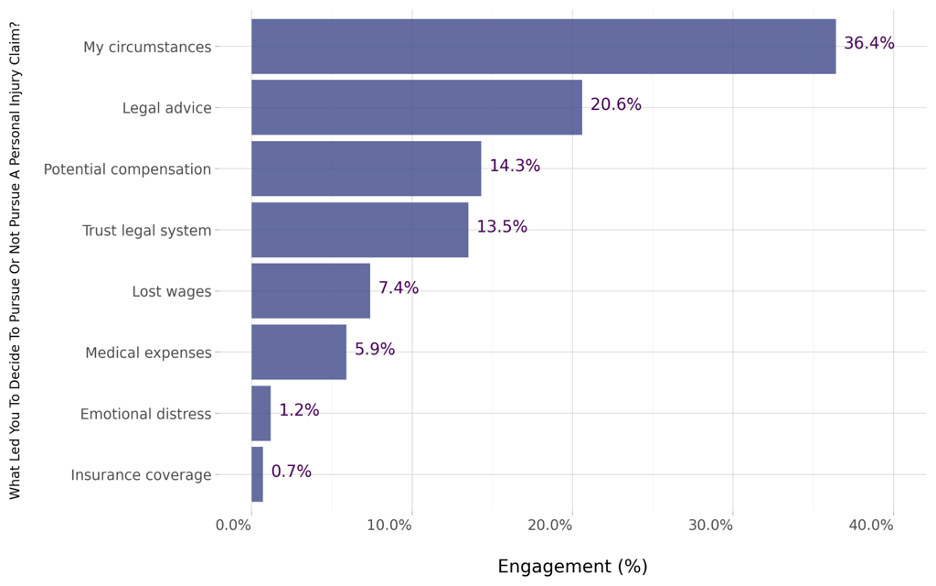
While thousands of British citizens who experience personal injury pursue personal injury claims, many do not. Our audience revealed the reasons why they either did or did not pursue claims after being injured. 36.4% cited their circumstances as the reason, while 20.6% said they acted on legal advice. 14.3% said their decision was motivated by personal compensation, and 13.5% named the trust legal system. 7.4% said they either pursued or did not pursue claims due to lost wages, while 5.9% said they were influenced by medical expenses. 1.2% said their choice was a result of emotional distress, while 0.7% said they based their decision on insurance coverage.
In 2023, the UK’s personal injury market was valued at £4.29 billion, representing a 3.8% increase on the previous year. Road traffic accident claims accounted for 73% of all claims made in 2023/24, although the number of claims fell year-on-year. The number of public liability claims climbed from 53,403 in 2022/23 to 58,933 in 2023/24, while employment liability claims rose from 43,728 to 44,547, and clinical negligence claims increased from 14,443 to 15,839.
What Alternatives, If Any, Have You Considered To Making A Formal Personal Injury Claim?
64.4% of the audience considered seeking legal advice as an alternative to making a formal personal injury claim
While formal personal injury claims are an important channel for compensation, they might not be the best option for some people. Take a look at the alternatives our audience considered:
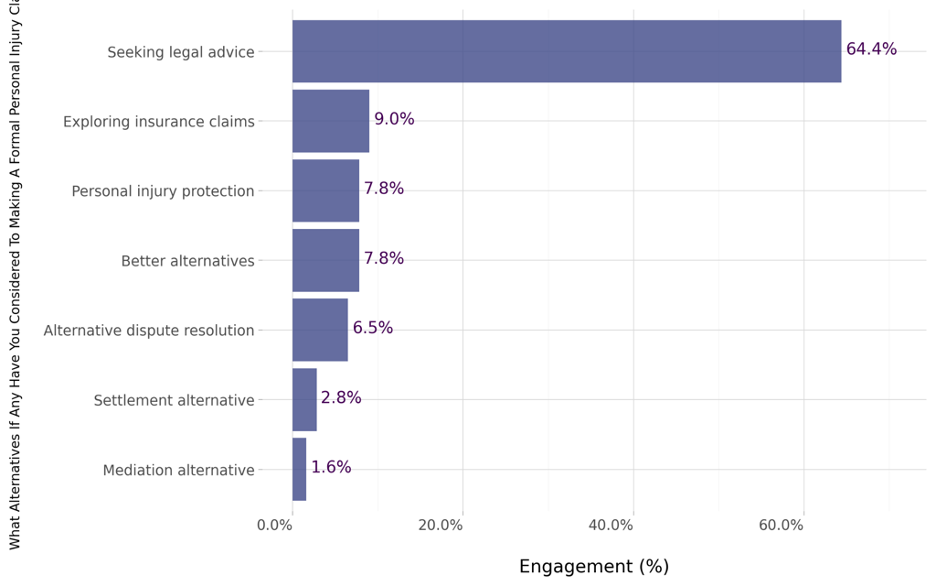
64.4% of British citizens who experienced personal injury said they sought legal advice as an alternative to making a formal personal injury claim.
In contrast, just 9% said they explored insurance claims, while 7.8% said they considered personal injury protection or considered better alternatives. Even fewer (6.5%) named alternative dispute resolution, 2.8% considered settlement alternatives, and 1.6% said they were happy to consider mediation alternatives. This highlights the overwhelming preference for legal advice as the primary approach to addressing personal injuries, with alternative methods significantly less favoured.
What Were The Biggest Challenges You Faced During The Claims Process?
33.9% of the audience say time delays were the biggest challenge during the claims process
As many British citizens have found out the hard way, the personal injury claims process can be drawn out and frustrating. These are the biggest challenges faced by our audience during the process:
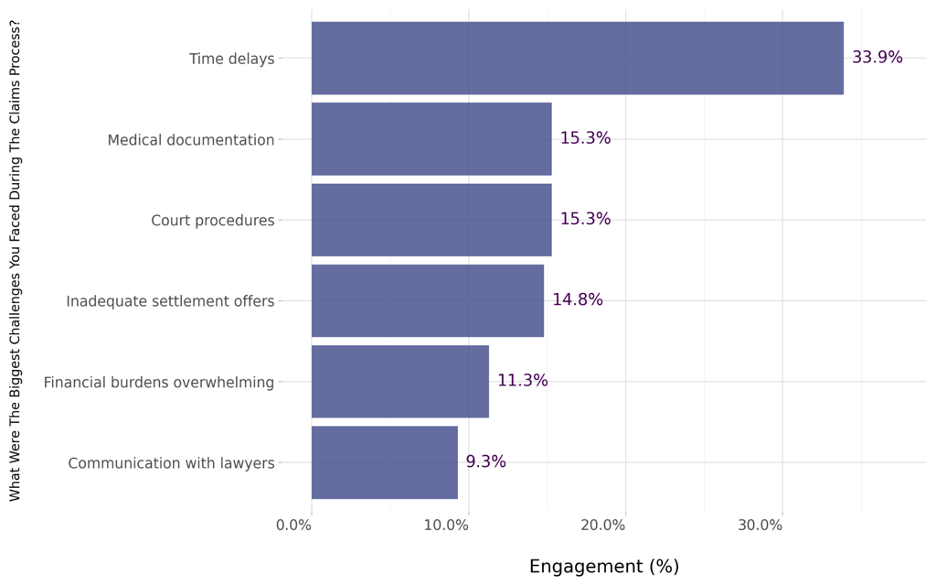
33.9% of our audience said time delays were the biggest challenge during the personal injury claims process. At just under half that, 15.3% said they faced the challenge of medical documentation, while another 15.3% said the biggest challenge during their process was court procedures.
14.8% named inadequate settlement as their greatest challenge, and 11.3% said that the financial burdens they experienced during the process were overwhelming. For 9.3% of the audience, communication with lawyers was the most challenging aspect of their claim process. This paints a clear picture of where the stumbling blocks are in the process and what needs to be addressed going forward to remove them.
What Were The Main Reasons For Choosing A Particular Law Firm Or Solicitor?
39.9% of our audience chose a law firm or solicitor based on positive client reviews
There are many reasons why British citizens who experienced personal injury choose a particular law firm or solicitor. Find out what they are:
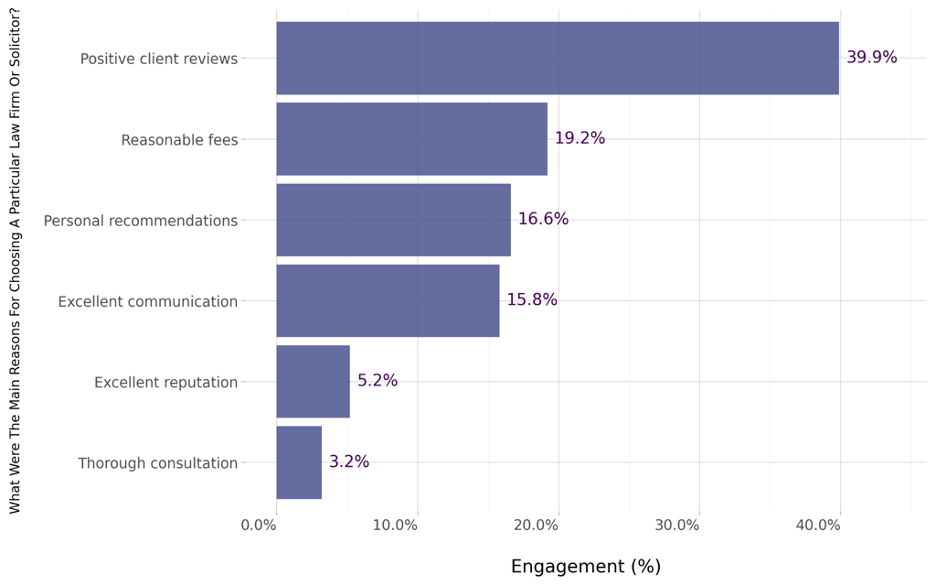
According to a 2023 survey, 84% of British consumers trust customer or client reviews. It’s not surprising, then, that 39.9% of our audience chose a particular law firm or solicitor based on positive client reviews. 19.2% based their decision on reasonable fees, while 16.6% said they relied on personal recommendations.
15.8% of our audience said that excellent communication was the deciding factor, while 5.2% said that they chose a firm or solicitor because of their excellent reputation. 3.2% of our audience said that they made their choice after thorough consultation, as this would likely give them confidence.
What Was The Outcome Of Your Personal Injury Claim?
50.2% of injured British citizens received a substantial insurance payout
If successful, personal injury claims can result in payouts or compensation. The graph below indicates the outcomes of our audience’s claims:
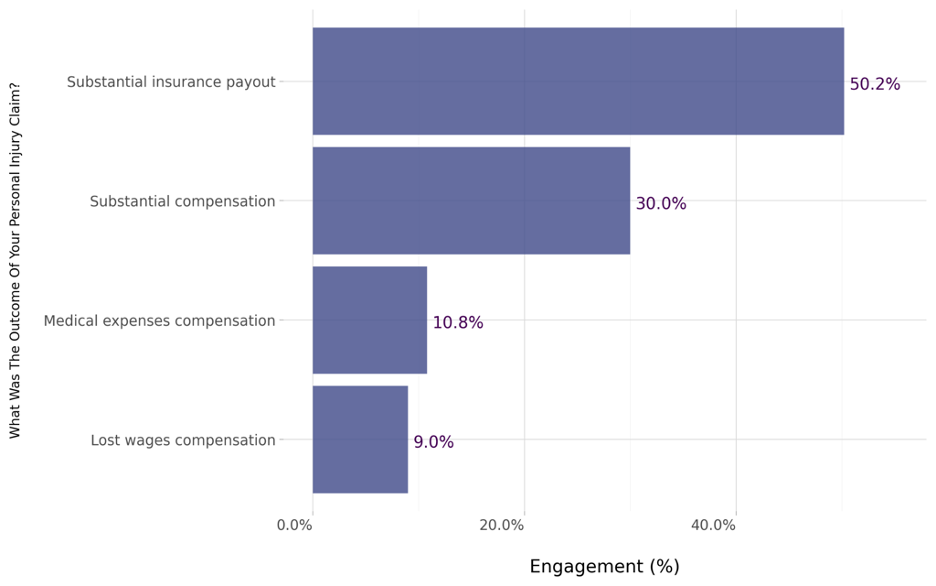
For little more than half of our audience (50.2%), a substantial insurance payout was the outcome of their personal injury claim. 30% said they received substantial compensation, while 10.8% received compensation for medical expenses. For 9% of our audience, the outcome of their claims was lost wages compensation. These payouts point to positive results, as the victims received some form of financial assistance.
Which Sources Of Information Did You Find Most Helpful When Learning About Personal Injury Claims?
27.9% of our audience found legal advice forms most helpful for learning about personal injury claims
British citizens who’ve experienced personal injury can turn to different sources for information, although some sources are more helpful than others. Here’s what our data reveals:
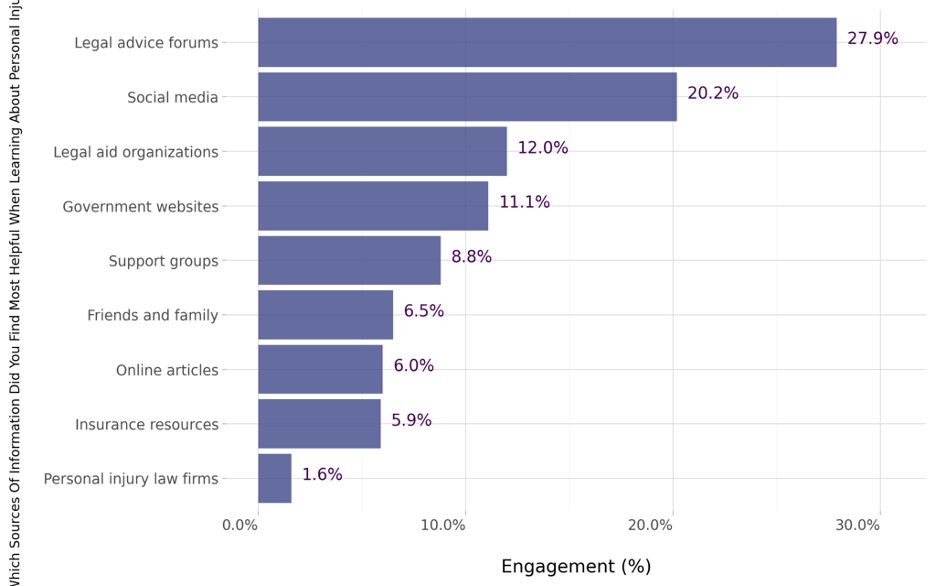
For 27.9% of our audience, legal advice forums were the most helpful sources of information when learning about personal injury claims. 20.2% said they found social media the most helpful, while 12% found legal aid organisations more helpful than other sources.
11.1% of our audience said that government websites were the most helpful, followed by 8.8% who named support groups as their leading source of information. For 6.5%, friends and family were the most helpful, while 6% said that online articles helped them more than other sources of information. 5.9% said that insurance resources helped them the most, followed by 1.6% who said personal injury law firms were their best information sources.
These statistics highlight that individuals rely heavily on accessible and informal sources, while more formal resources like government websites, law firms, and insurance resources are less commonly viewed as helpful.
What Could Be Improved In The UK Personal Injury Claims Process?
19.6% of our audience said legal representation could be improved in the UK personal injury claims process
Given their own experience of the UK’s personal injury claims process, our audience has different ideas about what could be improved. Find their answers below:
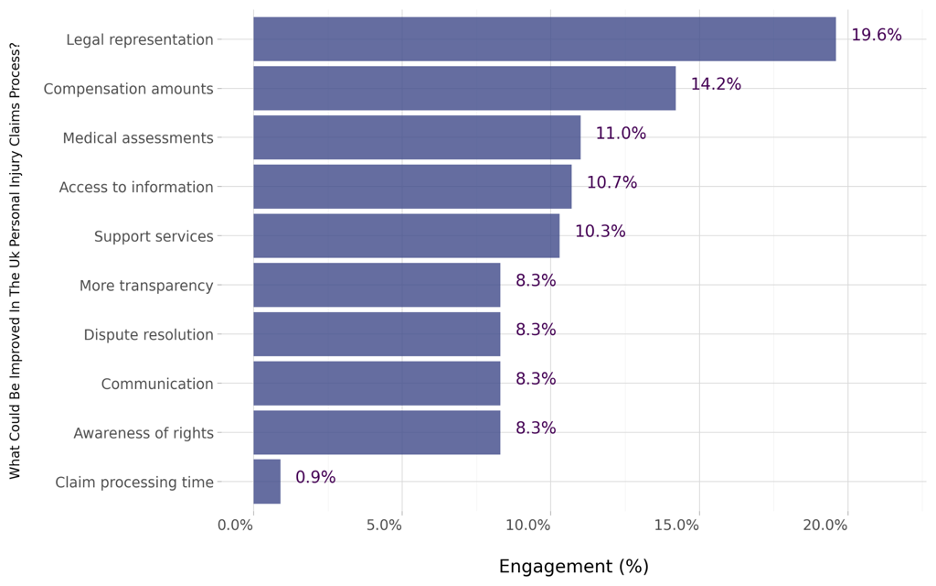
According to 19.6% of our audience, legal representation could be improved in the UK personal injury claims process. 14.2% thought compensation amounts could be better. In comparison, 11% would like to see an improvement in medical assessments associated with the process. 10.7% believe that access to information could be improved. 10.3% named support services as most in need of improvement.
Equal percentages (8.3%) of our audience said that the UK’s personal injury claims process needs more transparency and that improvements could be made to dispute resolution, communication, and awareness of rights, highlighting just how much of a consensus there is on these improvements. Only 0.9% of our audience said that claim processing time could be improved, which was interesting to note, as earlier, 33.9% of our audience said time delays were the biggest challenge during the claims process. However, in this case, it’s clearly less of a priority overall.
If You Experienced Another Personal Injury In The Future, How Likely Would You Be To Make A Claim?
57.5% of our audience said they would likely claim if they experienced another personal injury
Despite frustrations with the process, our audience would be open to making another claim if they experienced another personal injury in future. Here’s what our audience had to say:
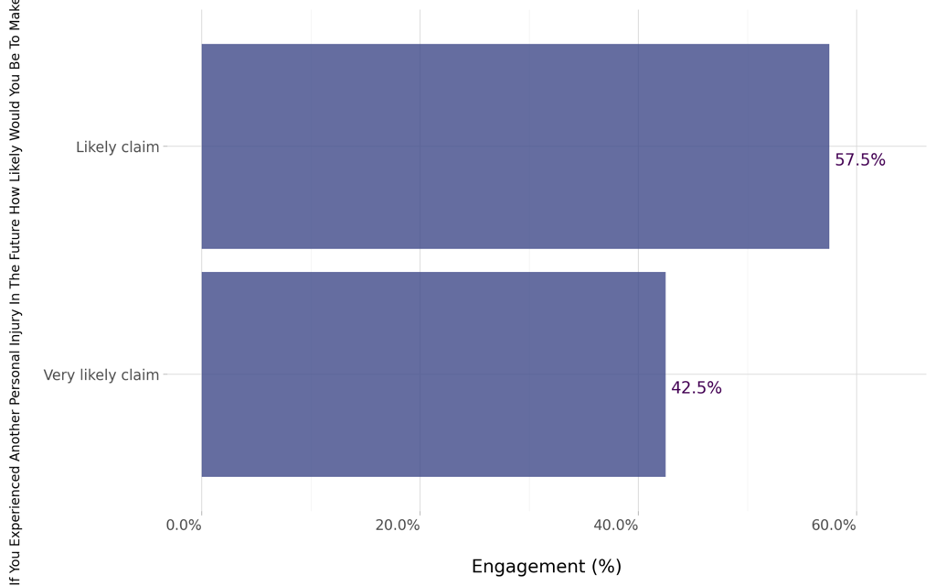
57.5% of British citizens who experienced a personal injury said they are likely to make another claim if they were injured again in the future. 42.5% said they are very likely to make a claim if they experience another personal injury. This may well be due to the compensation figures we mentioned above, which revealed that 50.2% of injured British citizens received a substantial insurance payout.
Current Trends in Personal Injury Claims
A Decline in Personal Injury Claims
Personal injury claims in the UK experienced a significant decline in the first quarter of 2024. The number of claims fell by 16% to 14,000 compared to the same period in 2023. This reduction was attributed to reforms in motor claim procedures and the implementation of the Official Injury Claim portal, which streamlined the process and potentially deterred fraudulent claims.
Increase in Private Equity Investment in Law Firms Specialising in Personal Injury
The UK has seen a marked increase in private equity investment in law firms specialising in personal injury. Last year, private equity investments in UK law firms and related businesses reached an estimated £534 million as a result of significant deals such as Inflexion’s £430 million acquisition. Fletchers Group reported a 36% increase in revenue and an almost quadrupling of profits to £8.3 million, which it attributed to private equity backing.
Introduction of Fixed Recoverable Costs (FRCs)
The introduction of Fixed Recoverable Costs (FRCs) in October 2023 has been an important development for personal injury claims in the UK. FRCs help provide clarity and control over legal costs, ensuring that they remain proportionate to the value of the claim. This initiative is designed to make the process more predictable and to prevent disproportionate expenses, benefitting claimants and defendants.
Increase in Claims Inflation
Claims inflation has become a serious concern in the personal injury sector. Some of the factors contributing to this include rising medical costs, increased compensation awards, and higher legal fees. The increase in claim values means that insurers and legal practitioners must adjust their strategies to manage the financial impact effectively.
Surge in ‘Crash for Cash’ Scams
The UK has witnessed a surge in ‘crash for cash’ scams in the last few years. These scams see individuals deliberately cause accidents so they can make fraudulent personal injury claims. According to The Guardian, one insurer found that the number of these scams had increased by 6,000% between January and December 2023, which was a massive jump from the previous year’s 50% increase. These scams inflate insurance premiums for honest motorists while posing significant safety risks.
Demographics
To better understand our audience, we analysed their demographics. Here’s what we found out about their age groups, genders, and locations in the UK.
Age
24.5% of British citizens who experienced personal injury are 65 or older
Our audience represented different age groups; here’s how they were distributed:
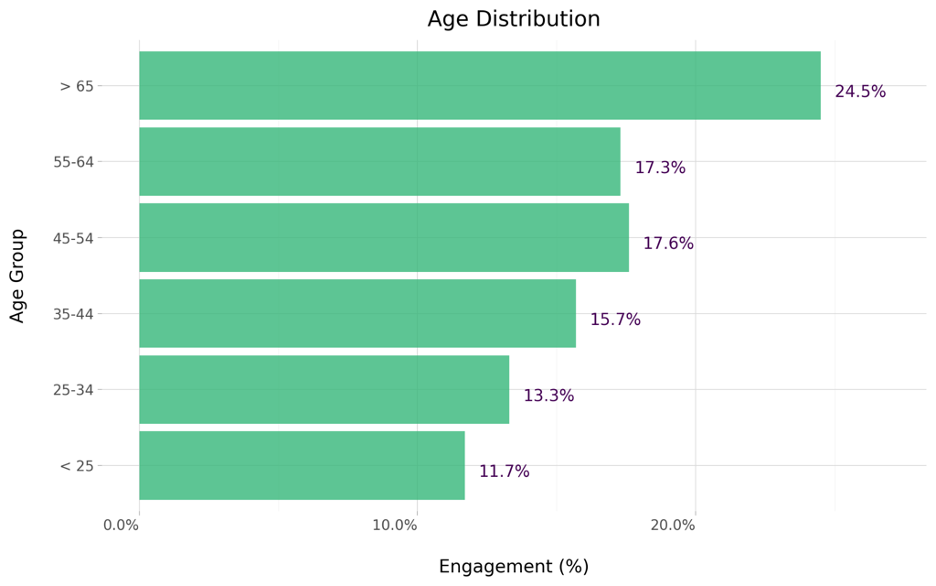
The most engaged group was 65 or older (24.5%), followed by the 45 to 54 age group (17.6%) and 55 to 64-year-olds (17.3%). As the groups declined in age, so too did the number of claimants, with those under 25 having the lowest (11.7%). This may be due to the fact that those who are older are more susceptible to injury, whereas those who are younger are generally stronger and more resilient physiologically.
Gender
53.1% of British citizens who experienced personal injury were males
Our audience was split almost evenly between men and women. Let’s take a closer look:
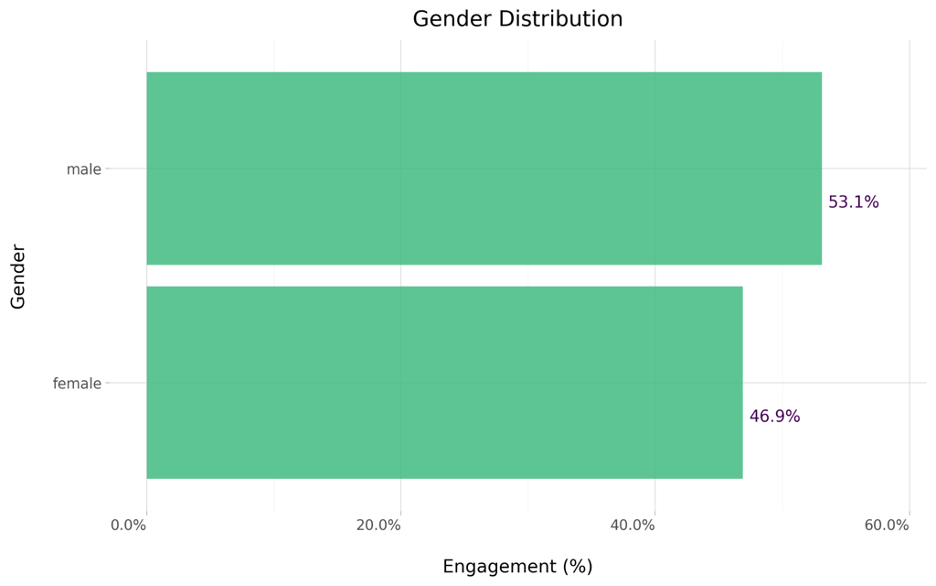
Males and females had almost equal representation in our audience. Of the British citizens who experienced personal injury, 53.1% were male and 46.9% were female. These findings are in line with Health and Safety Executive statistics, which reveal that 1,950 per 100,000 male workers were injured on duty, compared to 1,680 per 100,000 female workers who were injured.
Where In The UK Are You Based?
45% of British citizens who experienced personal injury are in Leeds
Our audience was comprised of people from around the UK. Here’s where they’re based:
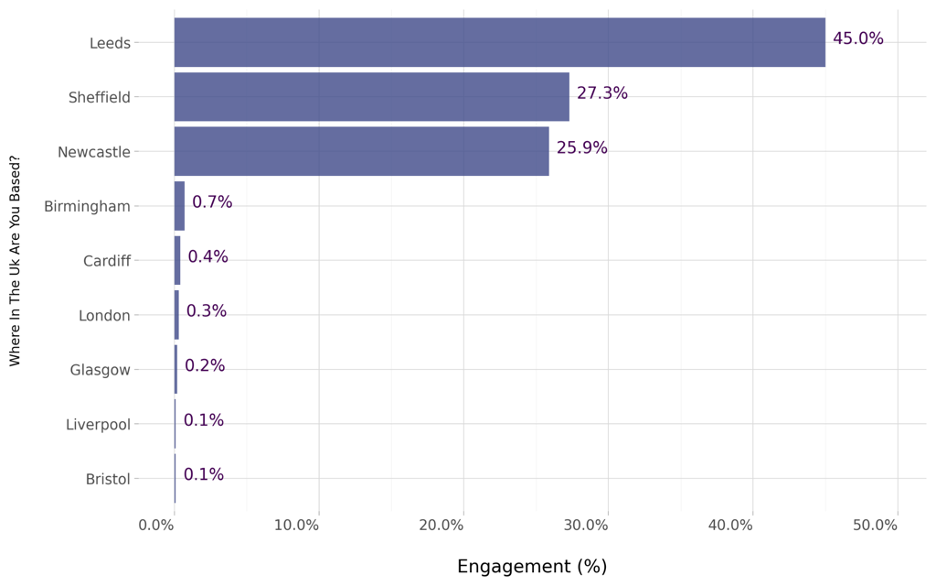
The data reveals that the majority of personal injury cases among the surveyed British citizens are concentrated in northern cities like Leeds (45%), Sheffield (27.3%), and Newcastle (25.9%), while southern and metropolitan hubs such as London (0.3%) and Cardiff (0.4%) report significantly fewer cases, and port cities Liverpool and Bristol garnering just 0.1% each This regional disparity suggests a potential link between personal injury occurrences and factors such as population density, industry presence, or regional awareness of personal injury claims.
As our data shows, men and women throughout the UK have experienced personal injuries that affected their lives in various ways. While the personal injury claims process can be frustrating, British citizens do have access to useful information and to solicitors like those at Dutton Gregory who can help them receive positive outcomes from their claims process.
About the Data
The data used to create the graphs used in this article were sourced from an independent sample of 305,550 British citizens who have experienced personal injury from X, Quora, Reddit, TikTok and Threads. Responses are collected within a 75% confidence interval and 5% margin of error. Engagement estimates how many people in the location are participating. Demographics are determined using many features, including name, location and self-disclosed description. Privacy is preserved using k-anonymity and differential privacy. Results are based on what people describe online — questions were not posed to the people in the sample.






